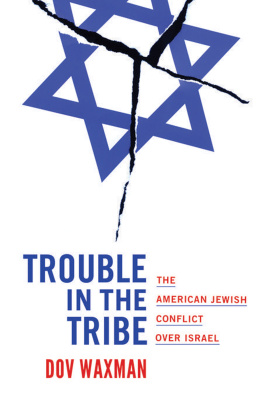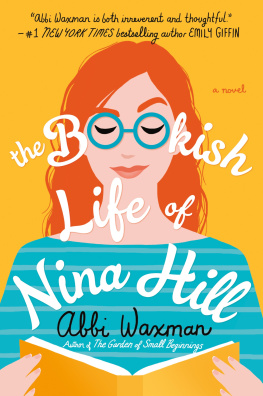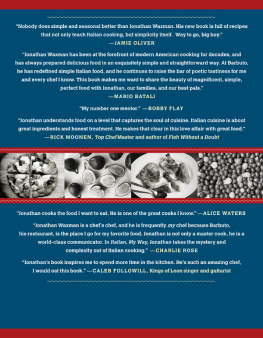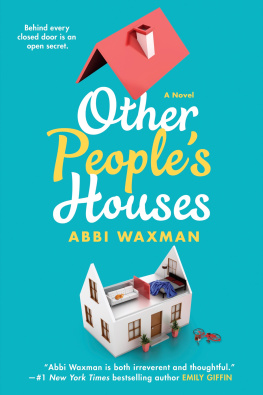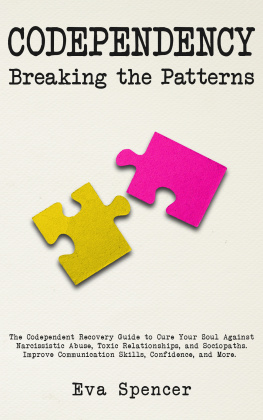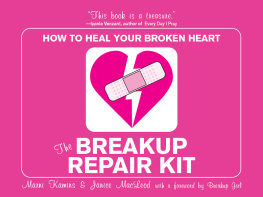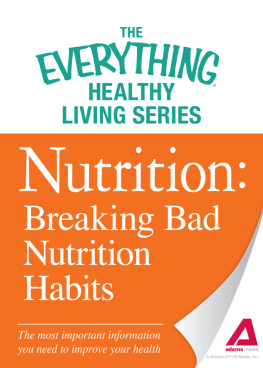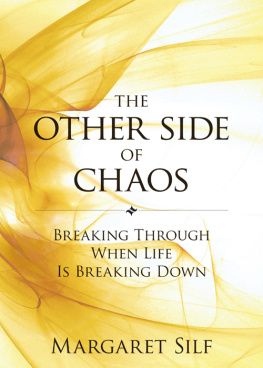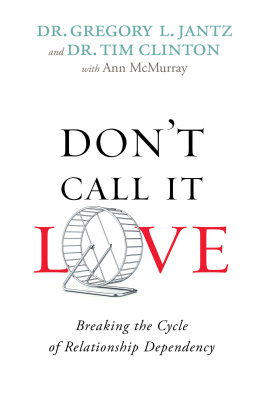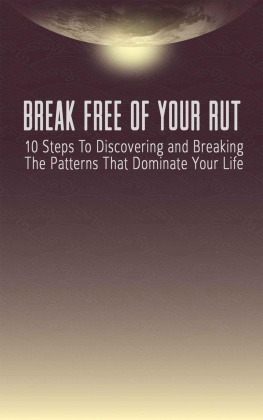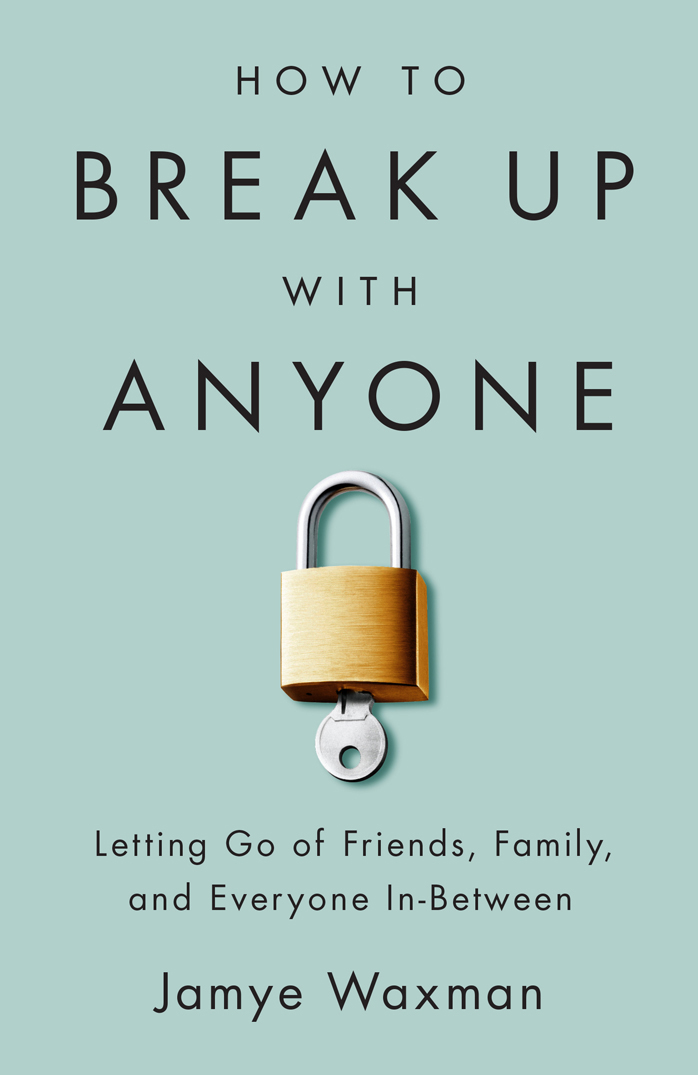
How to Break Up with Anyone
Copyright 2015 Jamye Waxman
Seal Press
A Member of the Perseus Books Group
1700 Fourth Street
Berkeley, California
sealpress.com
All rights reserved. No part of this book may be reproduced in any manner whatsoever without written permission from the Publisher, except in the case of brief quotations embedded in critical articles and reviews, and certain other noncommercial uses permitted by copyright law.
Library of Congress Cataloging-in-Publication Data
Waxman, Jamye.
How to break up with anyone: letting go of friends, family, and everyone in-between / Jamye Waxman.
pages cm
ISBN 978-1-58005-598-7
1. Friendship. 2. Conflict management. 3. Self-actualization (Psychology) I. Title.
BF575.F66W389 2015
158.2--dc23
2015019613
10 9 8 7 6 5 4 3 2 1
Cover design by Jason Ramirez
Interior design by Domini Dragoone
Printed in the United States of America
Distributed by Publishers Group West
To everyone I have ever been in a relationship withthen and now
CONTENTS
Guide
W hens the last time you counted how many relationships have ended in your life, and all the ways you let them go?
Odds are, you cant actually count them all. Thats because relationships are like orgasms: sometimes they sneak up on you and then suddenly disappear, and other times they last a whole lot longer than that. But when you think about it, no orgasm or relationship lasts forever (spoiler alert: we all die); its just that some relationships, like orgasms, end sooner than others. The long and the short of it is that you hope to have many of both in your life, which makes it harder to remember them all and easier to remember the best, or the worst ones.
For me, it was only as I began to write this book that I honestly began to explore my own breakups in detail. And, when I reflected back on my past relationships, I realized that I had no idea that many more of them had ended by choice instead of by chance (meaning they were lost in the shuffle of life).
Ive done a lot of breaking up. We all have. Whether or not we realize it, this is a common experience. People do just walk inand outof our lives. Sometimes they leave with a whimper, and other times its a lot bigger of a production.
The premise for this book came to me some years ago, after I had gone through a really difficult endship (a term I use for the ending of a close friendship). As I sat there feeling sorry for myself and for my loss (Or was it her loss?), I pondered the resources that were available to help me move on. After all, if I could no longer turn to the very friend I was losing, then I needed to find other outlets for my disenfranchised grief.
Sure, there were other people to turn to, but a lot of them were mutual friends who didnt want to be put in the middle (nor should they). Other people didnt understand why ending this friendship was such a big deal. And those who did understand only had limited time, or energy, to deal with a woman mourning the loss of a bestie.
So, I began looking around for other resources. I found that there were a lot of break up books for lost love of the sexy-time kind, but there was nothing out there for a girl who had lost another kind of loveone that was supposed to be guaranteed, like an everlasting gobstopper, to go on and on. It was then that I had this idea that a book about the subject could have helped me feel less alone. Not that a book would always make me feel better or be able to hug the hurt away, but that it could make me understand that this process is something we all process.
We may all do it a little differently, but there are general rules that can help guarantee a smoother and happier ending. And even though we dont all break up, or get over a break up, in the same way, the experience can be similar. Thats because there arent 101 ways to break up, even though there are a myriad of twists on one of the ways you can do it (face-to-face, over the phone/via text, in writing, through a mediator, or by disappearing).
Writing this book also reminded me that there are surefire ways to feel satisfied with a break up. Especially when you have the confidence to be secure, and the ability to stay consistent, in your decision. On top of that, its important to get clear with your reasons and keep the break up conversation as short and sweet as possible.
Research proves that the gold standard in ending a relationship is face-to-face, and a face-to-face ending provides more personal satisfaction and feelings of closure. Ive also talked with people who have ended relationships other ways, for example with parents over an email, by being kicked out of a cult, or with business partners via a text. Its not ideal, but sometimes the ideal situation adds a whole layer of stress that nobody can, or wants to, deal with.
The last two chapters of this book focus on closure and forgiveness. I, along with spiritual advisors and religious leaders, discuss the concept of forgiveness. Yes, its a complicated word, and an emotional topic. One that can seriously shake the foundation of what you believe when it comes to choosing to forgive someone youd rather forget.
I have since used this information to have happier and healthier break ups in my own life. I hope my words help empower you to make the choices that work best for you and to speak your mind when things arent working for you any longer. And whether its a break up or a break out, I hope this book helps you break free too.
Jamye Waxman
Santa Cruz Mountains, 2015
A ll sorts of relationships have expiration dates, not just romantic ones. Breaking up isnt always about falling out of love or deciding that this person isnt the one. Especially since being the one and falling in love arent options in all types of relationships in the first place.
Once its decided that a relationship with your mother, brother, best friend, cousin, gender identity, church, temple, cult, boss, business partner, acting coach, dentist, trainer, or even your own leg (or any other entity) is not working out, so begins the process known as breaking up.
There are lots of reasons people in non-romantic relationships break up. Sometimes they end because youre not happy or fulfilled. Sometimes they end because being around a certain person makes you go numb. Sometimes you just cant do it anymore, or you dont want to.
You already know the reasons people usually have for breaking up. But when the relationship doesnt involve romantic feelings, it can be way more difficult to explain the break up to anyoneincluding yourself. Especially when youre still trying to justify your reasons for ending a relationship internally (For example, why did you finally get up the eggs to end the relationship with your sister?), or to explain the break up to other people (How do you tell your mother that youre not talking to your sister any longer?). Most people dont expect you to break up with someone youre not getting horizontal with.
Its also difficult because youre about to end a non-romantic relationship in a world that values new beginnings, or at least multiple second chances. We live in a society happy to never say goodbye or, if we have to say goodbye, then we hope to say, Hello, again, someday. When we refuse to fistpump to the theme song of Everything is AWESOME! we may find it takes a lot of convincing (both of ourselves and others) to go with our gut. Still, sticking to our gut is essential, because break ups, while not popular by choice, play an important role in our ability to choose how we live our lives.


